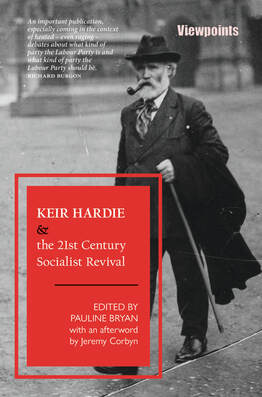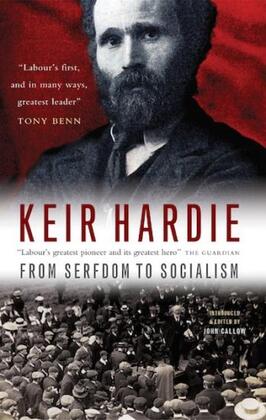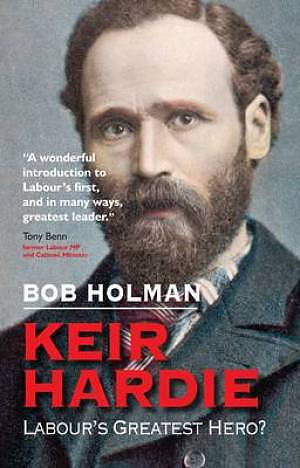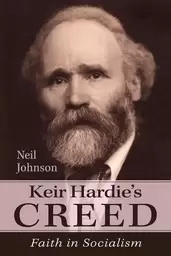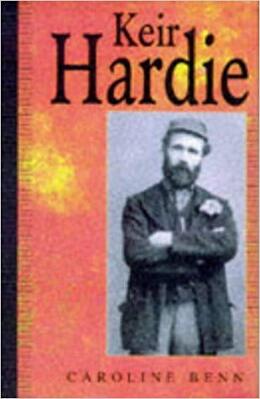Further Reading
|
Keir Hardie and the 21st Century Socialist Revival.
In this book, Pauline Bryan brings together a varied group of commentators to discuss his legacy, In their fascinating and varied essays, each contributor shows the importance of using Hardie’s legacy as a foundation for the future. Discussing his support for women’s suffrage and his fight to tackle unemployment, as well as his stance on issues of Home Rule and the British Empire, here they show how intrinsic his beliefs are to Labour Party politics to this day. ‘To remember Hardie is not to look wistfully backwards but to remind ourselves of the absolute necessity of unflinching principles, vision and determination in looking forward to the future we want to build.’ - Richard Leonard Available from Luath Press. What Would Keir Hardie Say?
Keir Hardie is a significant figure in British history. He is known as the founder of the Labour Party but his influence went much wider. 100 years after his death the question is still often asked, “What would Keir Hardie say?” A group of distinguished writers have come together to write about different aspects of Hardie’s life and legacy: Fran Abrams, Melissa Benn, Jeremy Corbyn, John Callow, Bob Holman, Cathy Jamieson, William Knox, Richard Leonard, Owen Smith, Dave Watson, Barry Winter. Each of them tackles one aspect of Hardie’s varied interests from his support for women’s suffrage, his internationalism, to his central role in the foundation of the Labour Party. Each essay considers the relevance of Keir Hardie’s work to our lives today. Luath Press 2015 From Serfdom to Socialism
As a key text for the first generation of Labour Party activists, From Serfdom to Socialism stands both as a founding document of the Labour Party and as the fullest exposition of Hardie’s political thought. It draws together into a coherent and explicitly socialist whole Hardie’s – often disparate – ideas on history, religion, women’s rights, and local and national government. In signalling the arrival of the Labour Party on the national stage, and defining all that it stood for, this book was to change the political landscape of Britain forever. John Callow introduces this reprint of the famous text. Lawrence and Wishart 2015 Keir Hardie: Labour's Greatest Hero?
Keir Hardie was a complicated man. Born illegitimate just outside Glasgow in 1856, his life didn't start gently. Before the age of ten he was the sole wage earner in his working class, atheist family. After the Christian baker he assisted fired him for being late to work (he'd been nursing his sick mother), he ended up in the coal pits at 11. He never went to school but was self-taught, avidly reading books lent him by a kind young clergyman. His life saw two major conversions: first to Christianity, and then to socialism. Most biographies omit the former, pointing out his experience of hardship as the source of his passion for social justice. But the role of Christianity in his life was profound, and without it a true picture of this extraordinary life cannot be drawn. Hardie was no plaster saint. But his fully human story - about rising above hardship to forge a better world - continues to be a source of inspiration today. Bob Holman - Lion Publishing 2010 Keir Hardie's Creed
Neil Johnson's Keir Hardie’s Creed: Faith in Socialism, is a slim and very readable book that focuses on how Christianity influenced Keir Hardie's life. It is the first in-depth exploration of Hardie's religious socialism. Our review: keir-hardies-creed.html Keir Hardie
This is probably the the best modern biography of former Labour leader Keir Hardie. "I am an agitator," he once said. "My work has consisted of trying to stir up a divine discontent with wrong." Widely regarded at the time of his death in 1915 as a failure, he is seen today as the inspirational founder of the Labour party, his name a source of pride. It was not just his socialism, but his utter and genuine principle in pursuing it. He believed in it almost religiously and was willing to suffer for that belief. Caroline Benn, Hutchinson 1992 (Sadly out of print, but used copies are available and in libraries) Keir Hardie: Radical and Socialist
The historian Kenneth Morgan sought to rescue Keir Hardie from his status as a sort of mythical figurehead and to present him as a more interesting, complex and credible person. In the context of the emerging Labour movement of the late nineteenth and early twentieth centuries, we see Keir Hardie as pacifist, internationalist, feminist, radical and socialist; a great man if always somewhat out of step with his time. This is an academic treatment of the subject. Published in 1975 by Weidenfeld and Nicolson although the later paperback can still be purchased new from a few places. The First Labour Government
This year is the centenary of the very first Labour Government in the UK, led by Prime Minister Ramsay MacDonald. Here, we tell the story of that government and pose some lessons from history for the Labour Party today. jan_24_election.pdf |
